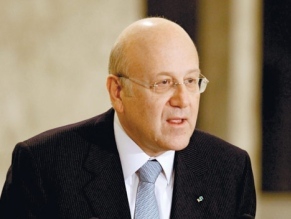|
World Jewish News

Najib Mikati. Photo by: Reuters
|
Lebanon's new PM is not Hezbollah and not Iran
26.01.2011, Israel and the World The incoming Lebanese prime minister, Najib Mikati, is not a representative of Hezbollah and certainly not of Iran. He is a close personal friend of Syrian President Bashar Assad, and even Saudi Arabia - the patron of the outgoing prime minister - hasn't spoken out against Mikati, a 55-year-old Sunni native of Tripoli.
France also proposed Mikati for the premiership, after it became clear that the compromise prime minister suggested by Saudi Arabia and Syria had been rejected. If Mikati has the support of Saudi Arabia, Syria and France, the United States will have a hard time opposing him.
Mikati served in the government of Prime Minister Rafik Hariri, in which he was responsible for public service and transportation, and was asked to briefly serve as interim prime minister following Hariri's assassination in 2005. Associates of Saad Hariri, the outgoing prime minister and Rafik Hariri's son, can also be expected to make their own political calculations and decide - perhaps with some Syrian and Saudi pressure - to join Mikati's government so as not to lose all their centers of power in the country.
He will have to be everyone's prime minister, a job description Mikati should not find too difficult. With a fortune estimated at $2.5 billion, Mikati showed his ability to identify business opportunities when he invested in African countries, created (with his brother ) the massive communications company Investcom - during the height of the Lebanese civil war, when he was just 27 - and later sold it to a South African investor.
Other business ventures of Mikati's include opening a chain of luxury goods, which has its own elite fashion line; founding the Geneva-based Baboo Airline; and establishing a family foundation that helps Middle Eastern students who want to study at the Harris School of Public Policy Studies at the University of Chicago.
There is virtually no large business in Lebanon that Mikati, a former chairman of the Lebanese trade bureau, does not have some connection with. And at the same time, he has managed to maintain the good name of a clean politician.
Mikati, who studied at the American University of Beirut, the international business school INSEAD and Harvard University, is not a good friend of Hezbollah leader Hassan Nasrallah and is far removed from the Iranian government.
"I am a moderate politician, I am always at an equal distance from everybody," Mikati told the BBC yesterday after he was designated to form the next government. But he knows why he was tapped for the job: He must remove the threat of the international tribunal investigating Rafik Hariri's assassination, or at least sever any connection between the Lebanese government and the panel's expected indictment of Hezbollah activists. That means halting Lebanon's funding of the tribunal and returning the Lebanese judges to the panel.
If Mikati does that - though he has not yet publicly committed to doing so - he will be able to argue, and justifiably so, that even Saad Hariri was willing to ignore the international tribunal, under certain conditions.
Hezbollah doesn't need Mikati to demonstrate its control over Lebanese politics. Any prime minister that meets its demands - including Saad Hariri - is good from its perspective.
Lebanon will not suddenly become more Iranian or more "Hezbollian" than it was two days ago. It will primarily be more Syrian, and that is a major difference, as Syria - which seeks to move closer to the United States and, thanks to France, sees itself as close to Europe - does not want Iran to seize control in its traditional sphere of influence.
Haaretz.com
|
|
